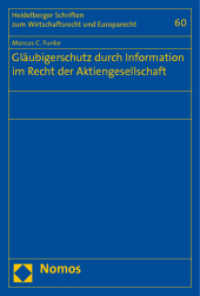- ホーム
- > 洋書
- > 英文書
- > History / World
Full Description
Hiob Ludolf (1624-1704) and Johann Michael Wansleben (1635-1679), the master and his erstwhile student could not be more different. Ludolf was a celebrated member of the Republic of Letters and the towering authority on Ethiopian studies. Wansleben, himself a brilliant scholar and, unlike Ludolf, a seasoned traveller in the Middle East, converted to Catholicism and eventually died impoverished and marginalized. Both stood at the centre of the burgeoning study of Ethiopia and spent a formative part of their career in middle sized Duchy of Saxe-Gotha which for several years played a pivotal role in Ethiopian-European encounters. This volume offers in-depth studies of the remarkable life and work of these two scholars in a broader intellectual, political, and confessional context.
Contents
Contents
Acknowledgments
List of Figures
1 Scholarship and the Quest for Ethiopia in the Seventeenth Century
Hiob Ludolf and Johann Michael Wansleben
Jan Loop and Asaph Ben-Tov
Part 1: Hiob Ludolf: at the Gotha Court and in the Republic of Letters
2 Der Kosmopolit
Hiob Ludolf im Lichte seines Stammbuches und des Reysebüchleins
Martin Mulsow
3 Hiob Ludolf als Amtsträger der Herzöge von Sachsen-Gotha
Holger Kürbis
4 Hiob Ludolf und die globalen Ambitionen im Herzogtum Sachsen-Gotha des 17. Jahrhunderts
Alexander Schunka
5 The Reluctant Alchemist
Hiob Ludolf (1624-1704) as Chymical Intelligencer and the Curious Elias Ashmole (1617-1692)
Vera Keller
Part 2: Johann Michael Wansleben: Oriental Studies and Republicanism
6 Wansleben the Archaeologist
Alastair Hamilton
7 Wansleben Reads Harrington
Wansleben, the Harrington Manuscript, and English Republicanism
Gaby Mahlberg
8 Wansleben's Interests in International Politics
Thérèse-Marie Jallais
Part 3: Ethiopia and Lutheran Germany
9 Ludolf und seine äthiopischen Lehrer in Europa
Der Gelehrte Abba Gorgoryos als Mitbegründer der Äthiopistik als wissenschaftliche Ethnographie
Wolbert G.C. Smidt
10 Peter Heyling als Äthiopienforscher
Jürgen J. Tubach
Part 4: Ludolf and Biblical Studies
11 Hiob Ludolf and Biblical Evidences
Scott Mandelbrote
12 Quail or Locust? What the Israelites Ate in the Desert
Ulrich Groetsch
13 An Appendix to Coffee in the Bible
Hiob Ludolf, Melchior Leydecker, and the Biblical Delicacy קלי (kali)
Benjamin Wallura
Part 5: Ludolf on the History of Languages and Writing
14 Hiob Ludolf, the Qurʾan, and the History of Writing
Jan Loop
15 Ludolf's Language Laws
Pitfalls in Describing and Comparing the World's Languages
Toon Van Hal
16 Kommen die Zigeuner aus Nubien?
Hiob Ludolf zu einer Herkunftshypothese über die Sprache der Roma
Martin Mulsow
Part 6: Ludolf and Natural History
17 Einhörner und Geranomachien
Ludolfs Wirkung auf die phantastische Zoologie seiner Zeit
Bernd Roling
18 Hiob Ludolf Observing Locusts
Asaph Ben-Tov
Part 7: Ludolf on Chronology and the History of the Holy Roman Empire
19 Die Zeitrechnung der Samaritaner
Ein Austausch zwischen Hiob Ludolf, Wilhelm Ernst Tentzel und Christoph Cellarius
Martin Mulsow
20 Hiob Ludolf als Präsident des Collegium Historicum Imperiale
Jacob Schilling
21 ‚... durch eine gewiße veranlaßung übernommen, historiam hujus seculi zu elaboriren ...'
Ludolf und die Allgemeine Schau-Bühne der Welt
Markus Meumann
Part 8: A Portrait of the Scholar
22 Die zeitgenössischen Portraits von Hiob Ludolf
Stefan Weninger
Index







